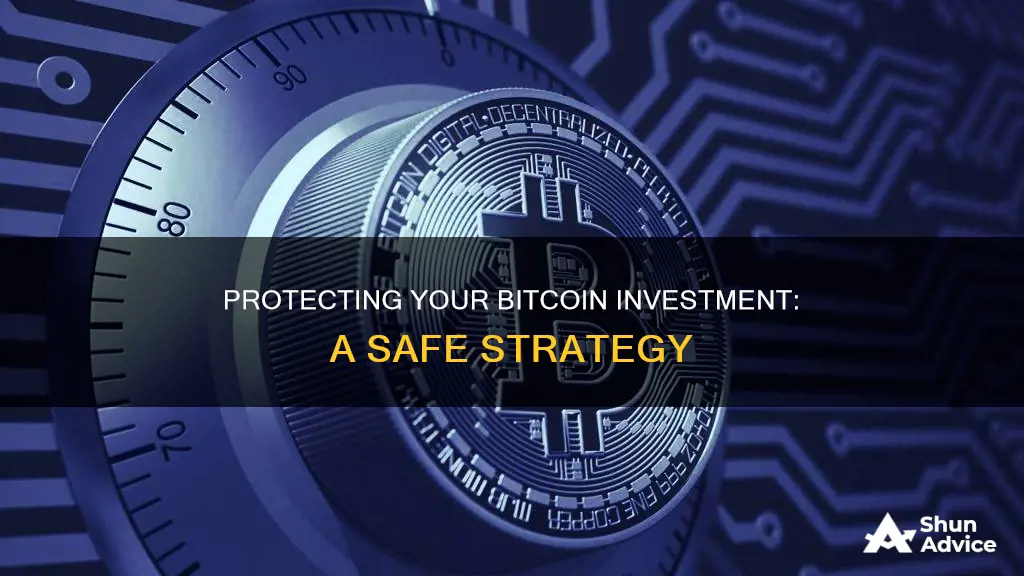
Bitcoin is a popular type of cryptocurrency that utilizes a large chain of interconnected computers to store and protect your digital assets. Bitcoin is a highly volatile asset prone to large and fast swings in value, which presents an opportunity for large returns but also poses tremendous risk. Here are some ways to invest in Bitcoin safely:
- Cryptocurrency exchanges: You can purchase bitcoin from cryptocurrency exchanges, such as Gemini, Kraken, Coinbase, and Crypto.com. Many offer dozens of cryptocurrency choices, while others simply have Bitcoin and a few alternatives.
- Traditional stockbrokers: Robinhood was the first mainstream investment broker to offer Bitcoin. Other online brokers that offer access to Bitcoin or other cryptocurrencies include Webull, TradeStation, and Fidelity.
- Bitcoin ATMs: These work like normal ATMs but can be used to buy and sell Bitcoin. They are often placed in locations where you might find normal ATMs, such as convenience stores.
- Bitcoin exchange-traded funds (ETFs): On January 10, 2024, the SEC opened the door for spot Bitcoin ETFs, which track the price of Bitcoin and trade over major exchanges. This was a long-awaited approval, expected to make it even easier for traditional investors to gain access to Bitcoin.
- Peer-to-peer money transfer apps: Cash transfer services like PayPal, Venmo, or Cash App allow users to purchase, store, send, and sell Bitcoin directly through the apps, which is convenient if you're used to those interfaces.
Once you've learned how to invest in Bitcoin, you'll need to store your Bitcoin in a hot wallet or a cold wallet.
| Characteristics | Values |
|---|---|
| Investment type | Cryptocurrency |
| Investment vehicle | Bitcoin |
| Investment method | Direct purchase, exchange-traded funds, crypto-related stocks |
| Investment amount | Flexible, can purchase a fraction of a Bitcoin |
| Investment risk | High, volatile asset, no central regulator |
| Investment advice | Do your research, don't invest more than you can afford to lose, consult financial professionals |
| Storage method | Hot wallet, cold wallet |
| Storage risk | Hot wallets are vulnerable to hacking, cold wallets are more secure but require technical knowledge |
| Storage tips | Use strong passwords, two-factor authentication, back up your wallet |
What You'll Learn

Choose a secure exchange
A cryptocurrency exchange is a platform that allows users to buy and sell cryptocurrencies, such as Bitcoin. When choosing a crypto exchange, it is important to select a reputable and secure platform that adheres to local regulations and security standards. Some popular and secure crypto exchanges that facilitate Bitcoin transactions include:
- Coinbase
- Binance
- Kraken
- Gemini
- Crypto.com
When creating an account on a crypto exchange, it is crucial to enable two-factor authentication and use a strong, unique password to enhance security. Additionally, it is recommended to use a secure and private internet connection when conducting financial transactions online.
It is worth noting that crypto exchanges may offer different features, fees, and consumer protections. Therefore, it is essential to research and compare multiple exchanges before making a decision.
Besides crypto exchanges, investors can also purchase Bitcoin through traditional stockbrokers like Robinhood, Webull, TradeStation, and Fidelity. These platforms may offer different advantages and disadvantages compared to dedicated crypto exchanges.
Strategic Bitcoin Investments: Growing Your Money
You may want to see also

Decide on a payment method
After choosing a crypto exchange, you need to fund your account before you can start investing in Bitcoin. The payment method you choose depends on the exchange, but it typically includes bank transfers, PayPal, a cryptocurrency wallet, or a debit or credit card.
Using a bank transfer is a good option as fees are usually lower than other methods, and you can avoid taking on debt to buy a volatile investment. Credit card purchases are usually treated as cash advances, which means higher interest rates.
Some exchanges operating in Australia offer instant AUD deposits using PayID. Exchanges such as Coinbase also allow you to connect your bank account directly or link a debit or credit card.
How to Place an Order
Once your account is funded, you can place your first order. Depending on the platform, you may be able to purchase Bitcoin by tapping a button or entering its ticker symbol (BTC) and the amount you wish to buy.
How Much to Buy
You don't need to buy a whole Bitcoin; you can buy a fraction. For example, if Bitcoin's price was $100,000, you'd need to invest that amount for a full Bitcoin. But if you invested $1,000, you'd get 1%.
Where to Store Your Bitcoin
Many crypto exchanges have integrated Bitcoin wallets, but some people prefer to transfer their Bitcoin to a third-party wallet for safe storage.
There are several types of wallets, each with its pros and cons:
- Custodial wallets: These are typically provided by centralised exchanges and are convenient, but they give a third party control over your assets.
- Software wallets: These are usually free and easily accessible, but they are less secure as they are connected to the internet. Examples include desktop, online, and mobile wallets.
- Hardware wallets: These are physical devices that keep your Bitcoin offline, making them the most secure option. Examples include the Ledger Nano S and Trezor, which cost between $120 and $220.
Bitcoins in India: Safe Investment or Risky Business?
You may want to see also

Place an order
Once you have chosen a cryptocurrency exchange, such as Coinbase, Binance, Kraken or Crypto.com, and have set up your account, you will need to fund your account before you can place an order for Bitcoin.
Depending on the exchange, you can fund your account via bank transfer, PayPal, a cryptocurrency wallet, or a debit or credit card. However, it is worth noting that using a credit card to buy cryptocurrency is usually treated as a cash advance and will be subject to a higher interest rate.
When your account is funded, you can place your first order to buy Bitcoin. Depending on the platform, you may be able to purchase it by tapping a button, or you may have to enter Bitcoin's ticker symbol (BTC) and specify the amount you wish to purchase.
It is important to remember that you don't need to buy a whole Bitcoin; you can purchase just a fraction, making it a flexible option for both small and large investors.
The Ultimate Guide: Invest in Bitcoin Without Third Parties
You may want to see also

Store in a cold wallet
Storing your Bitcoin in a cold wallet is a great way to ensure the safety of your investment. Cold wallets are physical devices that keep your private keys offline, making them secure from online hacking attempts and malware attacks.
There are three types of cold wallets: paper, sound, and hardware wallets. Hardware wallets are the most popular option for cold storage due to their ease of use, flexibility, and security. They are designed to securely store private keys offline, providing a convenient and secure way to manage cryptocurrencies.
When choosing a hardware wallet, it is important to select a reputable brand such as Ledger or Trezor. These wallets have a secure element, a dedicated chip designed for secure data storage and processing, adding an extra layer of protection. They also receive firmware updates to address potential security vulnerabilities and improve overall security regularly.
Setting up a Bitcoin cold storage wallet is straightforward. First, create an offline Bitcoin address to receive your Bitcoin. Then, send Bitcoin to the generated address. It is recommended to use a "paper wallet" method, which is completely free and highly secure.
By storing your Bitcoin in a cold wallet, you can have peace of mind knowing that your investment is safe from online threats.
The Bitcoin Comic: A Guide to Investing
You may want to see also

Be cautious of scams
When investing in Bitcoin, it's crucial to be cautious of scams. Here are some tips to help you avoid potential pitfalls:
- Be wary of any online service – any device connected to the internet is vulnerable to hacking.
- Use a strong password to encrypt your wallet.
- Opt for a hardware wallet that's disconnected from the internet whenever possible.
- Regularly back up your wallet and store your backups in multiple locations.
- Use multisignature security to maintain control of your coins even if one of your devices is compromised.
- Generate, write down, and hide your wallet's mnemonic seed – a group of words you can use to restore your wallet in case of a hardware failure.
- Never share private keys or passwords.
- Be vigilant and cautious: if something seems too good to be true, it probably is.
Additionally, it's important to understand the risks associated with different types of wallets. Hot wallets, which are connected to the internet, are more vulnerable to hacking. Cold wallets, on the other hand, are offline storage methods like hardware wallets or paper wallets, which offer greater security but may require additional technical knowledge to set up.
When choosing a cryptocurrency exchange, it's advisable to select one that prioritizes security. Look for features like two-factor authentication and strong password requirements. Even then, it's important to recognize that exchanges are not immune to hacking attempts and security breaches. As the saying goes in the cryptocurrency community, "not your key, not your coin." This underscores the importance of personally holding your private keys and not relying solely on exchanges or other third parties for the safekeeping of your Bitcoin.
Lastly, be cautious of pump-and-dump schemes, where predatory investors artificially inflate the price of Bitcoin by encouraging amateur investors to buy in, only to sell off their own holdings before the buying surge ends, causing the price to crash. Such schemes are illegal, and even if you inadvertently profit from them, you may become the target of an IRS audit or criminal investigation.
The Ultimate Guide to Investing in Dogecoin via Cash App
You may want to see also
Frequently asked questions
The best way to buy Bitcoin is through a reputable crypto exchange that offers a balance of ease of use, low transaction fees, and high security standards.
You can buy Bitcoin safely by using a secure, private internet connection and storing your Bitcoin in a cold wallet, which is a small, encrypted portable device that stores your coins offline.
One common rule of thumb is to invest no more than 10% of your portfolio in individual stocks or risky assets like Bitcoin.
You can store your Bitcoin in a hot wallet or a cold wallet. A hot wallet is a wallet that’s operated by either your cryptocurrency exchange or by a third-party provider. A cold wallet is a small, encrypted portable device, similar to a flash drive, that stores your coins offline.
Bitcoin is a very high-risk investment because it’s a volatile asset. That means that Bitcoin values may rise or fall dramatically in value over a very short period—even as quickly as a few hours or days.







